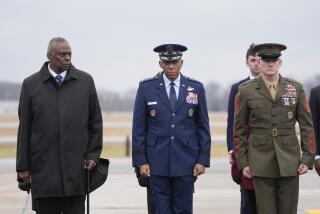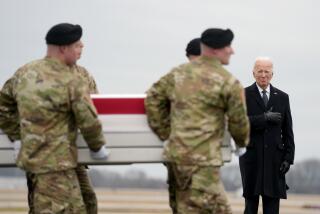Roadside Bombs Kill 6 U.S. Soldiers
- Share via
BAGHDAD — Iraqi insurgents killed six U.S. soldiers in deadly attacks as U.S. forces and Iraqi’s interim government today renewed attempts to establish control of rebel strongholds.
The largest blast occurred in eastern Baghdad late Tuesday night, when a homemade explosive blew up and killed three U.S. soldiers. This morning, another soldier died when a similar discharge came in western Baghdad, the military said.
Also today, a suicide car bomber plowed into a U.S. military convoy in the northern city of Mosul, wounding five American soldiers, two of whom later died. One soldier remained in the hospital, and two were returned to active duty, the military said.
The deaths marked the largest loss of life since mid-September, when U.S. officials in Iraq announced seven fatalities in scattered incidents. The latest deaths brought the unofficial tally of U.S. service members killed in Iraq since President Bush declared major combat over on May 1, 2003 to at least 1,072, including more than 16 this month.
Improvised bombs have become the main source of deaths for U.S. troops in Iraq, accounting for roughly half of the killing each month, according to the Pentagon. Officials declined to release more details about the latest deaths until the victim’s families have been notified.
Interim Prime Minister Iyad Allawi today threatened more attacks against Fallouja unless residents in the rebel stronghold turned in Abu Musab Zarqawi. Zarqawi, a Jordanian militant who is suspected of spreading widespread violence against American forces.
“If they do not turn in Zarqawi and his group, we will carry out operations in Fallouja, Allawi told the National Council today. “We will not be lenient.”
The crackdown comes as people brace for the holy Muslim month of Ramadan, which starts later this week. U.S. forces suffered a sharp increase in violent attacks last year during Ramadan.
The latest assaults came one day after the U.S. resumed their bombing campaign against militant targets in Fallouja.
Renewed fighting and U.S. airstrikes in western Iraq dimmed hopes that negotiations would peacefully resolve the months-long standoff with insurgents in the region.
After a four-day lull, U.S. warplanes destroyed a well-known restaurant and a house that military officials believed was being used as a hide-out by followers of Jordanian militant Zarqawi.
The strikes occurred as U.S. and interim Iraqi government officials negotiated with Fallouja tribal leaders and clerics in the hope of finding a peaceful resolution similar to the deal struck last week in Sadr City, a Shiite Muslim slum in Baghdad where militants had been battling U.S. troops. Previous negotiating efforts in Fallouja have failed.
Sheik Khalid Hamoud, a negotiator in Fallouja, said Tuesday that talks were continuing and he was hopeful that an agreement would be announced shortly.
U.S. and Iraqi military leaders have vowed to crush the remaining insurgent strongholds before the country’s first election in January. Joint U.S.-Iraqi forces have launched offensives in Samarra and northern Babil province. The peace agreement in Sadr City, if it holds, will eliminate another hot spot.
Fallouja and Ramadi — neighboring cities in Iraq’s so-called Sunni Triangle region — are widely seen as next on the list of targets.
Bush administration officials recently have backed off their tough talk, saying they would rather postpone major offensives until after the U.S. election on Nov. 2.
This week, interim Iraqi Prime Minister Iyad Allawi suggested that he might move against insurgent strongholds on his own. “We dictate our own actions,” he said.
Tensions rose in Ramadi on Tuesday as U.S. and Iraqi forces raided seven mosques, arresting four suspected insurgents and confiscating what U.S. officials called bomb-making materials. Among those detained was a local imam and his son, witnesses said.
Coming on the heels of an airstrike Monday on a mosque in Hit, the raids were part of a high-stakes U.S. strategy to root out militants who use religious buildings as sanctuaries.
U.S. officials previously were reluctant to attack mosques for fear of alienating devout Muslims. In the Shiite holy city of Najaf, for example, troops were often ordered to stay 100 yards from the gold-domed Imam Ali shrine, even though militants fired mortar rounds at them from the mosque compound.
“These raids sent a clear message to the insurgents that they can no longer use mosques as safe havens,” said Brig. Gen. Joseph F. Dunford, assistant commander of the 1st Marine Division. He said American troops remained outside the mosques while Iraqi forces led the raids.
Special correspondents in Fallouja and Najaf contributed to this report, along with Strickland in Los Angeles and the Associated Press.
More to Read
Sign up for Essential California
The most important California stories and recommendations in your inbox every morning.
You may occasionally receive promotional content from the Los Angeles Times.









